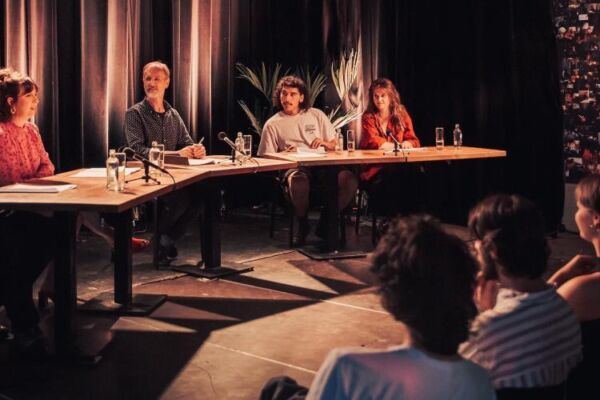First Year

Do you have a knack for crafting compelling stories? And can you put them on paper with ease? This course teaches you to create stories for film, theatre, prose, and more. You’ll develop your unique voice, learn to build suspense, and bring characters to life. Step by step, you’ll be guided into the art of storytelling.
Every film, stage performance, or audio story begins at the writer's desk. As a writer, you shape narratives that resonate with audiences. This program starts with the basics of writing fiction scripts. You’ll explore the technical and theoretical aspects of screenwriting across genres. Along the way, you’ll write extensively, conduct research, read widely, and watch films. As you progress, your focus will expand to other storytelling formats, including theatre, documentary, and prose.
The course blends theory with workshops and practice to refine your writing skills. You’ll learn how to construct plots, create characters, and write dialogues. A team of experienced lecturers, often actively working in the field, will guide you in discovering your own voice.
Great stories often emerge through teamwork. Throughout the program, you’ll frequently collaborate with students in Radio, Directing, Animation, Production, and Dramatic Arts. Together, you’ll develop stories, experiment with styles, and determine what works. By being involved in the realization process, you’ll see how your work comes to life on stage or screen.
The aim is to train inventive and versatile storytellers who can work in a variety of disciplines and professional settings after graduation. Whether you’re working solo or as part of a team, commissioned or independently, for audiovisual fiction, literary prose, or theatre, the essence remains the same: crafting a story that engages and moves an audience.
Are you considering a creative education in the audiovisual arts, but still have some questions? Come to one of our many information sessions and hear, feel, or experience what it's like at RITCS.



If you already hold a degree and wish to follow a shortened writing programme, you can take the admission test for the abbreviated track.
If transitioning from a professional bachelor's degree to a master's programme, you'll follow a bridging programme. If you have an academic background and want to pursue our master's degree, you'll undertake a preparatory programme. Both are ‘shortened’ tracks that do not grant a bachelor's diploma but provide access to the master's programme.
If you want detailed info on the subjects (assessment, examination formats...), please visit our study guide where you can find all ECTS sheets of our programmes:
All details about the bridging programme can be found here.
To start this programme, you must first pass an artistic admission test. The admission test consists of three parts: a dossier, an intake or selection interview and a workshop week. Read more about the admission tests here.
Erasmushogeschool Brussel pursues quality education and continuously develops its programmes to meet (inter)national quality standards.
EhB puts maximum effort into developing a culture of quality and uses its own quality direction as a foundation for quality education.
Various instruments guarantee the strengthening and safeguarding of the educational quality of this programme:
The Flemish government's education in figures website provides information on the profile of this programme such as who follows this programme, how long students take to obtain their degree, etc.
Read more about quality assurance within EhB.